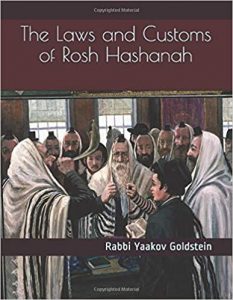*As an Amazon Associate I earn from qualifying purchases.
27. Conclusion of Rosh Hashanah that falls on Friday/Erev Shabbos:
Shnayim Mikra: On Erev Shabbos one is to read Shnayim Mikra after midday before Shabbos.
Heating up the food for Shabbos: One must prepare the food before Shabbos with enough time for the food to be hot and cooked before Shabbos.[1]
Candle lighting: One lights candles for Shabbos from a pre-existing flame at the usual time of candle lighting. It goes without saying that the candles may not be lit after sunset.
Hodu and Patach Eliyahu: Hodu is not said before Mincha[2] although Patach Eliyahu is recited as usual before Mincha.[3] See “The Laws and Customs of Erev Shabbos” chapter 1 Halacha 25
Avinu Malkeinu:[4] Avinu Malkeinu is omitted by Mincha.
Kabalas Shabbos:[5] When the conclusion of Rosh Hashanah falls on the eve of Shabbos, the evening service begins with מזמור לדוד instead of נרננה לכו. [However in Lecha Dodi the normal dialect of Berina is recited.[6] This applies even if one is reciting Kabalas Shabbos prior to the leave of Rosh Hashanah.[7]]
Havdala and Ata Chonantanu:[8]
When the second day of R”H falls on Erev Shabbos one does not say Havdala.[9] [Havdala is not recited either in prayer or over a cup of wine. Hence Veata Chonantanu is omitted in Shemoneh Esrei of Friday night, and one does not say Yaknaha”z by Kiddush].
When is the Rosh Hashanah Farbrengen to take place?[10]
In years that the conclusion of Rosh Hashanah coincided with Shabbos, up until 1984 the Rebbe would hold the Farbrengen as usual on the 2nd day of Rosh Hashanah which was Friday afternoon, entering into Shabbos with Pores Mapeh Umikadesh, although the Kos Shel Bracha would be delayed until Motzei Shabbos.[11] However from 1984 and onwards, due to the Halachic complications, this custom was stopped, and rather the Rebbe would hold the Farbrengen on Shabbos afternoon. The Rebbe would tell all the Chassidim to wash for bread at the start of the Farbrengen.
Performing Pores Mapa Umikadesh and the Nussach of Birchas Hamazon if it was performed:
See “The Laws & Customs of Erev Shabbos” Chapter 5 Halacha 1C!
Adding one minute to the conclusion of Rosh Hashanah:[12]
The Rebbe Maharash related that in each generation of the Rabbeim they added one more minute to the conclusion of Rosh Hashanah. Thus, by the Tzemach Tzedek, Rosh Hashanah concluded one minute later than it did by the Mittler Rebbe. By the Tzemach Tzedek, Rosh Hashanah concluded four minutes later than by the Baal Shem Tov. By the Mittler Rebbe it concluded three minutes later. By the Alter Rebbe it concluded two minutes later. By the Maggid it concluded one minute later. Every generation adds one minute. This is done in order to draw down Rosh Hashanah to the year.
[2] Siddur Admur
[3] Ketzos Hashulchan 77 footnote 3
[4] 584/5; 602/2; Meil Tzedaka; Rivash 512; M”A 584/3; M”E 584/11; M”B 584/4; Shaareiy Tziyon 584/7; P”M 584 A”A 6; Kaf Hachaim 584/7
Other opinions: From the Levush it is implied that Avinu Malkeinu is recited on Mincha Erev Shabbos. [Kaf Hachaim ibid]
[5] Sefer Haminhagim p. 121 [English]; Hayom Yom 3rd Tishrei; Ketzos Hashulchan 77 footnote 13 [that so is custom of many of Anash]; M”E 601/11.
The reason: As prior to Lecha Dodi the word Shabbos is not mentioned and hence it is still considered a continuation of Yom Tov in which the first five psalms are always omitted. [Ketzos Hashulchan ibid]
Other Opinions: The Shaar Hakolel 17/6 writes that when Shabbos falls on Issru Chag [Motzei Yom Tov] then we start as usual from Lechu Neranena.
[6] M”E ibid
[7] Sefer Haminhagim p. 52 [English] that even when R”H falls on Shabbos we say Verina. See Halacha 9!
Other Yomim Tovim: By a regular Yom Tov if one is reciting Kabalas Shabbos prior to the leave of Yom Tov then he is to recite Besuimcha instead of Berina. [Ketzos Hashulchan 77 footnote 13; See M”E 601/11]
[8] 491/4
[9] The reason: The reason for this is because the holiness of Shabbos is greater than that of the holiness of Yom Tov. [ibid]
[10] See Otzer Minhagei Chabad p. 149
[11] Sefer Haminhagim p. 120-121
[12] Sefer Hasichos 1945 p. 9-10; Otzer Minhagei Chabad p. 152


 Donate
Donate
Leave A Comment?
You must be logged in to post a comment.